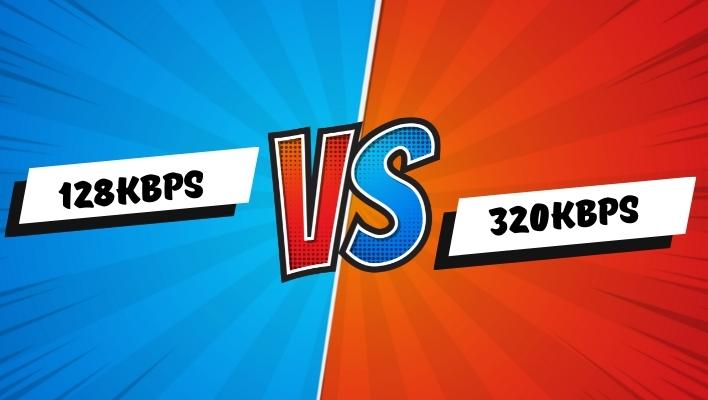MP3 audio format is undoubtedly one of the most popular digital audio formats thanks to its small file size. Since its inception, MP3 has allowed music lovers to easily store and share digital music files via either an online (internet) or physical (CDs, USB) medium.
But for you to enjoy high-quality music that will freshen up your mind, you’ll need to compress your files using the most appropriate bitrate. The bitrate, often abbreviated as kbps (kilobits per second), is the measure of the quality of the compressed files, and determines the audio resolution of your final audio files.
As a general rule of thumb, the higher the bitrate, the higher the sound quality, and the closer the resulting MP3 file is to the original music file. On the other hand, a low bitrate decreases the audio quality, but it is more than enough for radio listening and low-quality streaming.
If you’re planning to use MP3 files on your music player, but you are not sure which bitrate to use, this article is for you. We’ll discuss 128 kbps vs 320 kbps, the two being some of the most common MP3 file bitrates you’re likely to encounter.
But before that, here is a quick comparison of the two audio compression bitrates;
MP3 128 vs 320 Comparison table
| 128 kbps | 320 kbps | |
| File size | Small file size(less storage space) | Large file size(more storage space) |
| Audio quality | Low-quality compared to 320 kbps files | High-quality audio |
| Type of audio | CD-quality | HD |
| Clarity | Clarity also tends to suffer | Clearer |
| Downloading time | Faster to download | Takes more time |
What is 128 kbps?
128 kbps is a mid-range bitrate used to compress music files and is considered amongst the lowest bitrate for MP3 files. In terms of audio quality, 128 kbps are almost identical to CDs, but you can easily tell the difference if you have a trained ear.
An MP3 128 kbps simply means that 128 kilobits of audio data is compressed every second in order to play or stream that audio. The purpose of the compression is to help remove more of the higher frequencies that are deemed to be beyond the auditory resolution ability of most listeners.
MP3 files encoded using 128 kbps can be up to 10 or more times small compared to the original source file. This bitrate employs an aggressive algorithm in an attempt to discard or minimize the precision of frequencies that are less audible to human hearing.
This helps to record the remaining data in a more efficient manner, but in the process, it can lead to a loss of audio quality. In addition, excessive filtering out the high frequencies can be a problem if it makes your music lose critical treble notes. This can be a huge issue if the notes are the center of the music or when the background beats are the basis of the song.
Furthermore, this bitrate also lets you access more music from your MP3 player, plus it is the default format in most MP3 downloading sites. So if you’re looking for CD-quality audio, using 128 kbps audio quality will serve you well, but your audio quality will suffer a great deal as a result. In addition, the final file can introduce changes that the artist did not intend while creating the music.
Another notable drawback of this bitrate is that it does not accommodate HD audio, but it is more than adequate for radio-quality media. Another issue is the lack of oomph in the low end, where bass frequencies come alive. Furthermore, clarity and definition in other frequencies also tend to suffer.
Advantages of 128 kbps
- Downloading a song using 128 kbps is much easy and quicker
- The small size also makes it easy to transfer files across the internet
- Files encoded at 128 kbps require smaller storage space due to the compact nature of the files
- Best for radio-quality music files
Disadvantages of 128 kbps
- Audio quality suffers a great deal
- Compressed parts cannot be recovered or reversed

320 kbps Meaning
The 320 kbps is the highest bitrate supported by a standard MP3 file. While using this bitrate, it simply implies that 320 kilobits of data are utilized per every second to play the file. This translates to a more detailed and clearer file, thereby giving you a more pleasurable listening experience.
This bitrate is ideal for listeners downloading or listening to high-resolution audio that requires a higher bitrate. Generally, the resulting file sizes are bigger than that 128 kbps audio media file, which means they also offer the best quality audio media.
In other words, a music file encoded at 320 kbps will ultimately sound stunning compared to the same file encoded at 128 kbps, but the former results in a sizeable file. So if you’re using a large storage device such as a hard disk drive, then it is would be a good idea to take advantage of the sound quality of 320 kbps MP3 files.
On the flip side, if your device offers limited storage space, such as when using an MP3-compatible smartphone, it would be wise to go for 128 kbps files. However, for phones with expandable memory, we would recommend you use a higher bitrate for an enhanced listening experience.
In a Nutshell;
- 320 kbps= Higher bitrate/seconds=Extra sound information=High quality sound= More storage space
- 128 kbps= Low bitrate/seconds= Few sound information=Low quality sound= Less storage space
Advantages of 320 kbps
- Exceptional sound quality- superior quality over 128kbps music files
- Less missing audio parts
- Balanced audio
- Music instruments are more pronounced
Disadvantages of 320 kbps
- Requires more storage space
- Downloading files is also a bit slower
- 320 kbps files are large, so you’ll require more time to download the files

320 kbps vs 128 kbps- Which is Better?
With the invention of audio compression, the days when it would take you forever to download music files are long gone. Audio compression takes advantage of human hearing to significantly reduce the size of the file from the source data. This helps to eliminate any material deemed useless to the human hearing range.
Although 128 kbps offers a lower sound quality, there are still a good number of decent-sounding files. What matters the most is how the song is mastered and mixed. This is because every song is different, and it is not uncommon to find 320 kbps versions that sound horrible. At the end of it all, the true judge will be your ears.
To understand the difference between the two formats, you can start by listening to the same song in both formats. Provided you’re using high-quality headphones, you should be able to pick the difference in terms of clarity and the notes in each format.
Now to determine the best audio bitrate to use, you’ll first need to access your individual needs. Generally, your choice of the most ideal bitrate between 320 kbps and 128 kbps will boil down to your taste and application needs.
For instance, if you prefer working with small files, it would be a wise idea to stick to 128 kbps. On the other hand, if you’re after audio quality that’s almost identical to the original material, then 320 kbps is the format to go for.
In addition, if storage space is a primary concern, encoding your music files using 320 kbps will eat into the storage space rapidly. On the contrary, 128 kbps files consume considerably less storage space per minute, so if you are working with limited storage space, this is the bitrate to go for.
However, if storage space is not an issue, it is always a good idea to go for the highest bitrate available. A higher bitrate allows you to enjoy the best sound quality possible, plus you can always size down to a smaller file whenever needed.
Final Thought!
It is a no-brainer that audio encoding has revolutionized the way we listen to music while making it easy to manipulate audio over the internet. More and more internet download sites are continually advancing and coming up with better ways to improve audio files while keeping them as small as possible. However, we cannot deny the fact that it has also altered the quality of the end result, especially when using a lower bitrate.
Today, 128 kbps is generally considered the lowest acceptable bitrate, while 320 kbps is the highest, but it is almost impossible to pick up much difference in terms of what you hear. The audible differences between the two mainly depend on the type of music you’re listening to (i.e. the nature of the frequency range) or even your age.
